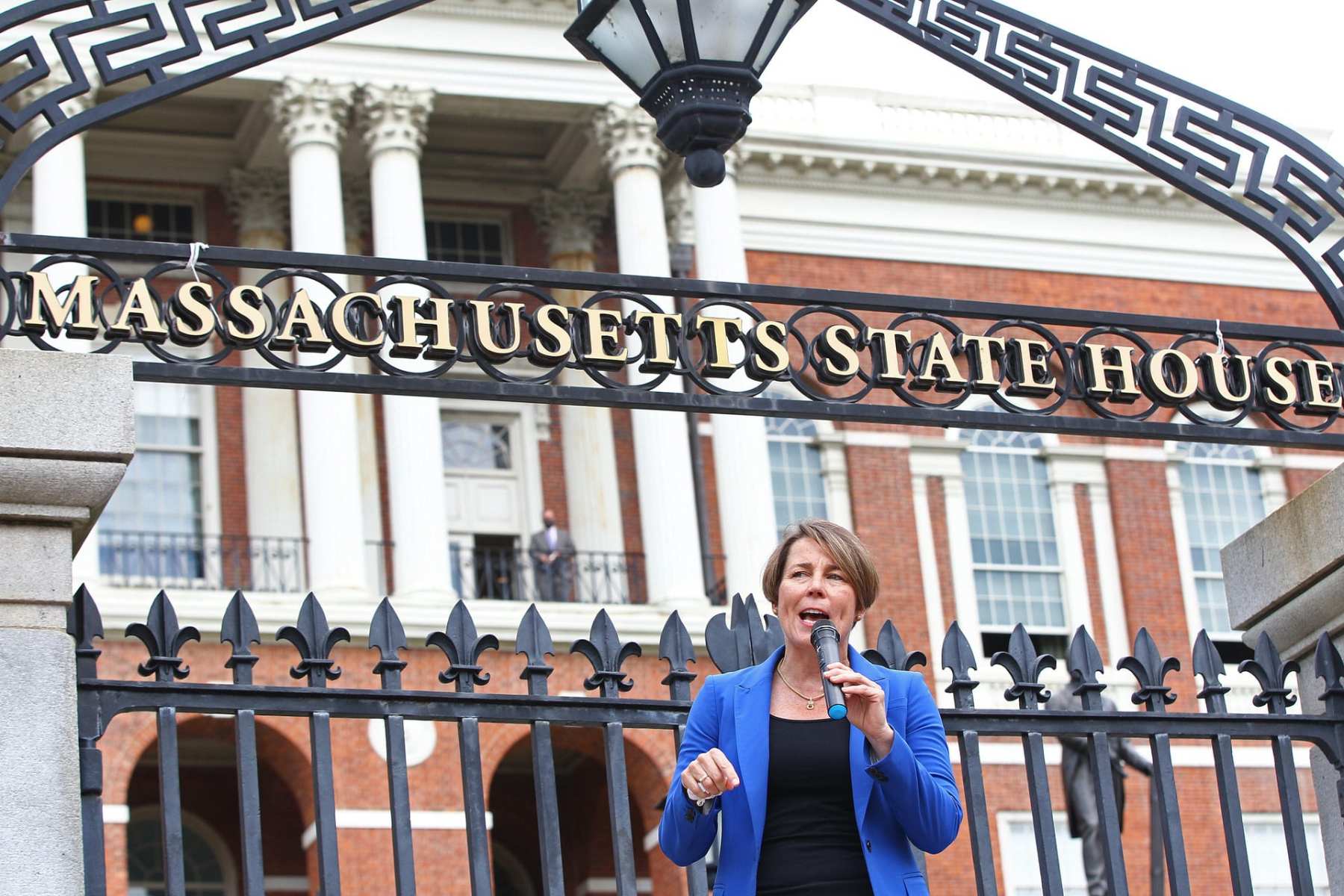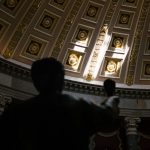Maura Healey does worry about the unknown.
While the attorney general of Massachusetts is no stranger to threats of violence in her work as the state’s chief lawyer and law enforcement officer, the recent riot at the U.S. Capitol by supporters of President Donald Trump has placed her and other attorneys general on high alert. The FBI released an internal bulletin after the attack that warned of armed protests at all 50 state capitols and Washington, D.C., ahead of the January 20 inauguration of President-elect Joe Biden and Vice President-elect Kamala Harris.
Around the country, state officials are responding. National Guard members have been activated. Law enforcement has beefed up their presence at state Capitol buildings, where many lawmakers have returned in recent weeks for the start of new legislative sessions. In Wisconsin, crews boarded up exterior windows at the state Capitol in Madison.
Healey said while there are no specific threats of violence in Massachusetts beyond what has been reported, she’s coordinating with federal authorities and other states’ attorneys general in case that quickly changes. She was clear that nothing is guaranteed in terms of what the next days look like: “I think that in this environment, you cannot be cautious enough.”
Even a crackdown on online platforms that authorities say allowed far-right groups to organize at the U.S. Capitol has its caveats, as right-wing extremists turn to secret online messaging platforms to plan action around the inauguration.
“You wonder about what you’re missing, where people have moved to in terms of other sites, where they may be coordinating, where they may be conspiring, where they may be planning. So you’re worried about what you don’t know,” she said.
Healey spoke with The 19th about how she’s working with local, state and federal authorities to ensure public safety.
This interview has been edited for length and clarity.
Barbara Rodriguez: You are the chief lawyer and law enforcement officer in Massachusetts. What has your job entailed since the January 6 insurrection at the U.S. Capitol?
Maura Healey: Obviously what happened is incredibly serious. It was so disheartening to see the desecration and the destruction of the United States Capitol, which has been a beacon of democracy and freedom to so much of the world for so long. And I’ll tell you what we’re doing here on the ground in Massachusetts: I’m committed to ensuring the safety and the security of our state assets, our government buildings, our people. We’ve been working really closely with partners in law enforcement to be ready. There is no First Amendment protection for violence, and anyone who attempts a repeat of what we saw last week will be met with the full force of the law. The other thing we’re doing, in addition to preparing for and making sure that things are tied down here and we’re protecting against all threats, is that we are looking into, along with federal law enforcement, what actions and conduct by individuals in Massachusetts occurred and that may have contributed to the violence that we saw last week.
Following the attack, there have been reports of threats of violence around the country, including state Capitols, and I wanted to know what you could tell me about what that means in Massachusetts.
I’m limited in what I can tell you. I will tell you that right now, there are no active or known threats against state assets here apart from some of the general activity and chatter we’ve seen online about protests at state Capitols, January 17 through 20. That said, we need to continue to be monitoring closely what we’re seeing online or hearing elsewhere, so that we are aware of any threats. And we’re in close communication with the FBI about anything that they’re hearing.
What are you most concerned about going into the next several days?
It’s one thing to know that a lot of this traffic was online. Of course, some of the platforms have shut down. So you wonder about what you’re missing, where people have moved to in terms of other sites, where they may be coordinating, where they may be conspiring, where they may be planning. And number two, [I am] concerned about the lengths to which an individual may go. If you look at what happened last week, with every day that passes, a new video comes out and new footage comes out, and provides more information, it actually becomes worse and worse and scarier and scarier, in terms of the picture. You saw just how unbridled and brazen, ruthless and violent, individuals could be. I mean that they actually literally dragged police officers and beat them. It’s threatening to kill them. It is just so, so appalling. So you’re dealing with a really violent form of extremism, and it concerns me about the lengths that any one individual or group might go to.
Do the threats emerging in recent days feel like a shift? Like something bigger is happening?
They don’t feel like a shift so much as they feel like this is the manifestation of what has been building for a long time. I mean, we’ve got a real problem in this country with white nationalism and white supremacy. It’s been there. It’s been beneath the surface, but unfortunately we had in Donald Trump somebody who literally gave a microphone to these hate groups and violent extremist organizations. And so with that, they have become all the more emboldened and are now out in public spaces, engaging in and doing all sorts of things that they feel a sense of empowerment to do, probably because of the collective complicity in this country and our failure to take on and end white supremacy. So I don’t see it as a shift. It’s just, this is what happens. And this is the result of what we’ve seen building out there, and what in particular, Donald Trump and his enablers have fostered, particularly over the last four years.
You’ve called out the urgency of ending white supremacy. What role do you see your office playing in that kind of long-term work?
We play a role in a few ways. First of all, holding those accountable who need to be held accountable for violent insurrectionist acts, making sure that we’re very clear in our messaging and in our actions that we will not tolerate acts of aggression, of violence. We will not tolerate white supremacy. [For] the National Association of Attorneys General, the priority and the theme of this year is focused squarely on ending hate violence and hate and looking at and going after and holding accountable these extremist groups. I think you’re going to continue to see us, as state AGs, very active and vocal.
As a Democratic AG — and I’m co-chair of the Democratic AGs — it came to light recently that our Republican AG association had, through its (c)(4), paid for a robo call that invited people to the march. And so that obviously needed to be called out. It’s been positive to see corporations respond and say they’re going to withhold their donations from individuals or organizations that may have violated the law. So that’s another role that I have, that we have this calling for accountability, not just for private citizens but accountability for those in elected office.
What happens after next Wednesday, in terms of the sense that we’re entering a new phase of extremism and domestic terrorism in the country?
I don’t think the work ends next week. Because those groups, those extremist groups and individuals who participated in and engaged in activity like we saw last week at the United States Capitol, are here and present. And they need to be held accountable, and that work will continue. And so, just because Trump goes away doesn’t mean that extremism goes away, doesn’t mean that white supremacy goes away. That’s going to be ongoing work, both through law enforcement and also through communication and education, and that’s going to be something that I think we’re going to have to engage in collectively, inside and outside of law enforcement.
What is your message to people who are wondering where the country goes from here?
Last week was a very dark day in American history. It was also the manifestation and culmination of something insidious, and a cancer that has been spreading. It is imperative that we be unified as Americans in holding those accountable for the violent attack on our Capitol, and that we be absolutely committed to work at the local, state and federal level to investigate and hold responsible those who committed the acts last week and those leaders who spread conspiracy theories, who spread lies about the election, who helped incite that raging mob. I do want people to know that our election was free and fair, and that violence is not going to be tolerated.
On a positive, you see a lot of people who are speaking out right now, coming together, calling for that sort of accountability. And that’s a positive and something that we need to continue to work on. No one law enforcement agency is going to change culture. No one action by a law enforcement agency is going to end white supremacy. It needs to be a collective effort of law enforcement, of community, of government, of people outside of government, corporate America. It’s got to be a collective action, and that’s what I want to support.
Is there anything else on your mind that you feel is relevant to this conversation? I do want to give you that space.
I just think that this is a moment where we have such an imperative. And there is such an urgency. And we have to seize it.






